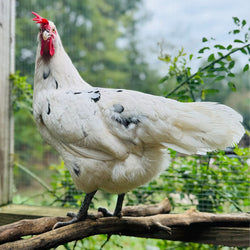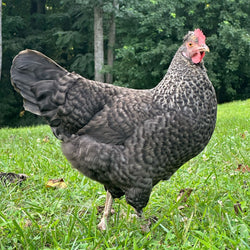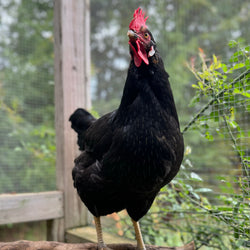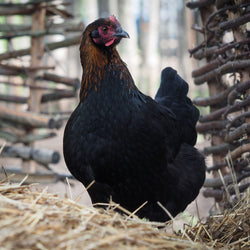f=menu&page=5/--
Frequently Asked Questions
Here we answer the most commonly-asked questions about ordering, chicken care, and more.
Chicken Glossary
Bantam A variety of chicken that is 1/4 to 1/2 the size of a Standard chicken breed, kept mainly for ornamental purposes. Some chickens come in both Standard and Bantam varieties; some come in just Bantam and some in just Standard. Bedding A material, usually wood shavings, added to the coop floor and nest box in order to absorb odor and droppings and provide a soft surface for chickens to walk on. Bloom The delicate, invisible membrane outside an egg's shell that protects the contents from bacteria and other foreign matter. Brood 1. The desire of hens incubate and be...
Read MoreCan I have two phone numbers printed on my box?
Yes! During the checkout process you will have the opportunity to give us two different phone numbers. If you give us two, we'll make sure both appear on your box. It's fine to have just one phone number appear on your box if you just have one number convenient to receive a call. Don't worry! Our number will appear there, too, so if the post office can't reach you, they can try us!
Read MoreHow will I know that my chicks have arrived at the post office?
Good question! First of all, don't forget that our baby chicks can arrive any day from Tuesday through Thursday of the week they are shipped--it just depends on how quickly the post office delivers to your area. So have your brooder and everything prepared by Monday (so you don't have to scramble)...but don't worry if it's a Tuesday or Wednesday and your chicks haven't arrived yet. As to how you'll know they're at the post office, in our experience most POs ask customers to pick up their peeping packages right at the post office on the day of arrival. We...
Read MoreI live in Hawaii and I'm ordering chicks. What do I need to know?
Yes, we can ship baby chicks to Hawaii. Unfortunately, waterfowl and pullets cannot be shipped at this time There is additional paperwork involved with shipping chicks to Hawaii, so please allow give a lead time of 2-3 weeks. You won't be able to place a last-minute order because your state's Department of Agriculture wants to know exactly what chicks will be arriving and where they are going. After you place an order destined for Hawaii, we'll be in touch to confirm details and ensure that your shipping date provides us with sufficient time for your state's approval. Your state requires...
Read MoreMy chicks are available on different dates. Are the chicks shipping at different times, or all at once?
Your chicks will ship all at once! All of your chicks must ship together for their safety. Alternatively, you can choose to place two or more separate orders, with each one meeting the safe chick shipping minimum. Don't worry--our shopping cart enforces that minimum, so you can't accidentally order too few for shipping safety. Minimum order requirements for baby chicks: April - November: 3 baby chicks December - April: 8 baby chicks When you place your virtual chicks in your online basket, you will be given an estimate of the first shipping date they will all be available on the...
Read MoreCan you ship chicks to my location?
We can ship chicks anywhere within the continental U.S. and to locations in Hawaii, Alaska. 3-14 Baby Chicks: $75.00 (Express Mail & Special Packaging) 15-24 Baby Chicks: $40.00 (Priority Express Mail & Packaging) 25+ Baby Chicks: $25.00 (Priority Express Mail & Packaging) Alaska: (3-14 Baby Chicks): $95.00 up to 14 chicks, 15+ is calculated at checkout (Express Mail & Special Packaging) **Note: Orders to Hawaii require a physical address and a 2-3 week lead time to file for the permit.** Our Chicks ship from Ohio. Unfortunately, we CANNOT ship to Puerto Rico, Guam, Virgin Islands, Canada, Mexico, or any other country. We also cannot ship to...
Read MoreHow can so few chicks arrive at their location safely?
Most hatcheries require 15 or 25 baby chicks per order because the chicks need one another's body heat to survive their 2-day journey. This is a big pain for lots of people who just want a few chickens! Since our goal in life (yes, our goal in life!) is to make your life easy, we've partnered with a forward-thinking hatchery that has developed a brand new way of shipping baby chicks that includes a high-tech, long- last heating element. This keeps the chicks nice and warm for their journey! And when you order fewer than 15 chicks we automatically send...
Read MoreFrequently Asked Questions about Chickens
Q: Do you need roosters for hens to lay eggs? A: No. This is one of the most common misconceptions about chickens. Hens will lay eggs just as well in the absence of roosters. If roosters are present, however, the eggs maybe fertilized! Q: How often do chickens lay eggs? A: That depends on three main factors: The breed of chicken. Some chickens are bred for meat production and lay few eggs; some are bred for egg production and can lay as often as once a day; some are bred as "dual purpose" andare good for both egg-laying and...
Read More







"The Clubhouse" Coop
Easy to assemble and built to last, the Clubhouse Coop is the perfect starter coop for a small flock.











